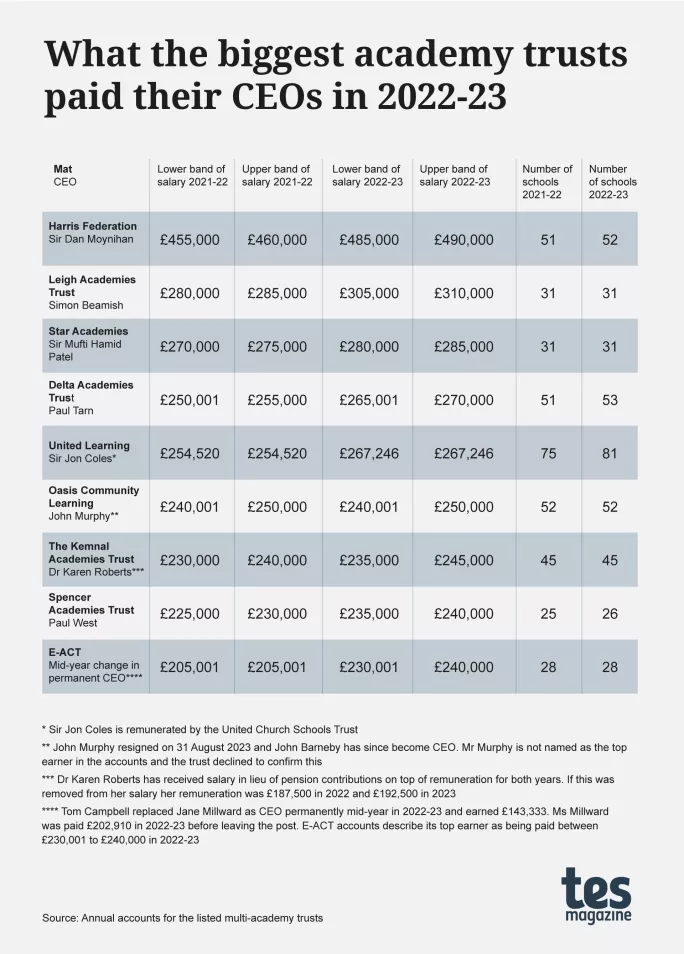Revealed: What the largest trusts paid their CEOs in 2022-23

Around one in five of the country’s biggest multi-academy trusts (MATs) increased their chief executives’ pay by £10,000 or more last year, Tes analysis of the latest published accounts reveals.
The leaders of at least 11 larger trusts running 25 or more schools were paid at least £10,000 more in 2022-23 than a year earlier, according to trust accounts.
The minimum pay increase awarded to top earners in three of those trusts was at least £25,000 last year.
Meanwhile, more than two-thirds (68 per cent) of larger trusts with 25 schools or more awarded pay rises to their chief executives in 2022-23.

Leaders’ salaries remained within the same minimum and maximum pay bands over the two years at a further nine trusts - although pay rises could have been awarded within these bands.
There was a reduction in the pay of the top earner at seven MATs.
The Tes CEO pay analysis also found there were four school trust leaders being paid £300,000 or more in the academic year ending in August 2023, including two at trusts responsible for a small number of schools.
The findings have led to renewed calls for the establishment of a national pay scale and codified system for determining the limits of CEO pay.
However, the Confederation of School Trusts (CST) has said its 2023 survey of executive leadership roles, published last year, found a median salary rise of 5 per cent, broadly in line with the average teacher pay rise of 5.4 per cent that year.
CST chief executive Leora Cruddas said: “Each trust is different and it is difficult to fairly compare roles across organisations, particularly as trusts grow.
“There is a clear requirement on trust boards to follow a robust evidence-based process in setting executive pay, and it is right that there is transparency on how public funds are used.”
The biggest pay increases
MAT accounts include details of their top earning staff but these figures are sometimes presented through minimum and maximum pay bands, indicating a £5,000 or £10,000 range within which the CEO’s pay sits, rather than providing the exact figure.
Looking at the difference between maximum pay bands in 2022 and minimum pay bands in 2023, accounts show there were at least three larger trusts where the top earner’s salary increased by more than £25,000.
Sir Dan Moynihan, CEO of the Harris Federation, based in London and Essex, continues to be the highest-paid academy trust leader in the country.
Sir Dan’s salary rose from between £455,000-£460,000 in 2021-22 to £485,000-£490,000 last year - a period in which its accounts show it grew by one school to a total of 52.
- Pay: Call for CEO salary limits in major shake-up of school system
- Last year: What the big academy trusts paid their top leaders
- MATs: Big rise in academy trusts with in-year deficits
Meanwhile, Alun Williams, CEO of the 28-school South West trust Midsomer Norton Schools Partnership, received a pay increase to £220,001-£225,000 in 2022-23, up from £190,001-£195,000 the previous year.
A spokesperson for the trust said pay is benchmarked against similar trusts and based on the performance of the CEO.
A summary evaluation of the trust from Ofsted in summer 2023 said the CEO’s guidance helped the trust and its leaders focus on school improvement.
The trust spokesperson added that some very challenging schools improved quickly in the trust, and said “appropriate remuneration is awarded for excellence”.
Nicholas Postgate Catholic Academy Trust based around the North East and North Yorkshire was the third large trust to award a pay rise of over £25,000 last year.
It increased CEO Hugh Hegarty’s salary from £160,000-£165,000 in 2021-22 to £190,00-£195,000 in 2022-23 - a year in which it gained 11 schools to become a 38-school trust.
The trust said an independent benchmarking exercise was commissioned for the salary banding of a CEO of a trust of its size and concluded Mr Hegarty’s “pay band reflected the expanded remit for the new and much-enlarged entity”.
Several trusts paid rises of at least £20k
At Leigh Academies Trust, which has 31 schools in the South East, chief executive Simon Beamish saw his pay increase from £280,000-£285,000 in 2021-22 to £305,000-£310,000 in 2022-23. This followed an increase from the £255,000-£260,000 he was earning in 2020-21.
The accounts for the 28-school E-ACT academy chain show the pay banding of its top earner moved from £205,201 in 2021-22 to between £230,001 and £240,000 in 2022-23. The trust said the account figures relate to its former chief executive Jane Millward.
E-ACT had two chief executives employed during 2022-23. Current CEO Tom Campbell was seconded to the trust as interim CEO in 2021-22 before taking over permanently in January 2023.
Accounts for last year show Mr Campbell was paid £143,333 in 2022-23, while Ms Millward was paid £202,910. Tes has asked E-ACT to clarify whether the £230,001-£240,000 figure would have been Ms Millward’s full-year salary.
Other trusts paying at least £10,000 more in 2022-23 include Delta Academies Trust in Yorkshire and the East Midlands, where CEO Paul Tarn saw an increase from £250,001-£255,000 in 2021-22 to £265,001-£270,000 in 2022-23. The trust moved from 51 to 53 schools last year, according to accounts.
David Ross Education Trust said its CEO Stuart Burns had declined a pay increase in previous years since 2020-21 until last year. In 2022-23 his pay rose from £170,000-£180,000 to £190,000-£200,000.
A spokesperson for the trust said it is “worth noting that no employer’s pension contributions are made for him, which is fairly atypical in the sector”.
CEO salary increases
Meanwhile, Sir Jon Coles, CEO of the country’s largest MAT, United Learning, who is remunerated by United Church Schools Trust, received a 5 per cent pay rise to £267,246 last year, during which the trust took on a further six schools, pushing its total to 81.
At Academies Enterprise Trust, chief executive Rebecca Boomer-Clark saw a salary increase from £200,000-£205,000 to £220,000-£225,000.
At Unity Schools Partnership, chief executive Dr Tim Coulson’s salary increased from £170,001 in 2021-22 to £182,000 in 2022-23. The trust took on an extra school in 2022-23 taking it up to 32 schools.
The salary of Nikki Edwards, CEO of Bath and Wells Diocesan Academies Trust, went up from £145,000-£150,000 in 2021-22 to £165,000-£170,000 in 2022-23. The trust, based in Bath and around Somerset, had 37 academies at the end of 2022-23, up from 34 the previous year, according to the accounts.
The salary of Oxfordshire’s the River Learning Trust’s chief executive Paul James went up from £145,000-£150,000 in 2021-22 to £160,000-£165,000 in 2022-23.
Trusts paying less after CEO changes
Some of the big trusts paid their top earner less last year. At Bishop Hogarth Catholic Education Trust, the top earner was on £160,001-£170,000 in 2022-23, down from £200,001-£210,000 the year before, according to the trust’s accounts.
Mike Shorten stepped up to CEO from deputy CEO when Dame Maura Regan left as leader at the end of August 2022.
At the White Horse Federation, former CEO Dr Nicholas Capstick earned £265,000-£270,000 in 2021-22 before he retired. Paul Smith was paid between £210,000 and £215,000 as CEO for 2022-23.
Smaller trusts paying big salaries
Two school leaders at smaller trusts, responsible for two and six schools respectively, were paid more than £300,000 in 2022-23.
Dr Dayo Olukoshi, executive principal at Brampton Manor Trust, which runs two schools in London, was paid between £310,000 and 315,000 - up from between £280,000 and £285,000 a year earlier.
However, the accounts show his pension contributions paid went down to £20,000-£25,000 in 2022-23 from £65,000-£75,000 in 2021-22.
The top earner at Thomas Telford School in Shropshire was paid between £300,000 and £310,000 last year, up from £290,000-£300,000 in 2021-22, according to the accounts of Telford City College Technology Trust Limited, which is responsible for the school.
Sir Kevin Satchwell is described as the executive head of the school in the accounts and is also the executive adviser of the Thomas Telford MAT, which comprises five other schools.
The Thomas Telford MAT’s website says it receives collaborative support from Thomas Telford School under a service arrangement. Sir Kevin is not named in the Thomas Telford school accounts as its top earner.
Calls for CEO pay bands
Tom Richmond, a former Department for Education adviser and head of the EDSK think tank, said: “No one disputes the idea that senior leaders who take on extra responsibilities should be fairly remunerated for doing so.
“That said, the salaries that some MATs are handing out to their CEOs are completely unjustifiable, particularly at a time when so many schools are facing acute financial pressures.”
A recent EDSK report called for the introduction of a national pay scale for all senior leaders in state-funded schools, including MATs.
Mr Richmond added: “This would ensure that those individuals in charge of larger groups of schools can be rewarded for their efforts without allowing anyone to exploit the freedoms that MATs currently enjoy.”
‘Clarity and transparency’ of CEO pay
NAHT general secretary Paul Whiteman said the school leaders’ union has called for executive roles to be codified within a revised school teachers’ pay and conditions document that reforms the national pay system.
“This would better define the roles and responsibilities for the full range of executive leadership roles and bring helpful clarity and transparency to the pay of executive leaders,” he said.
Daniel Kebede, general secretary of the NEU teaching union, said: “The existence of this layer of highly paid senior leaders is also one of the fundamental inefficiencies of the academy system, which creates duplication and sucks up funding that should be spent on educating children.”
Geoff Barton, general secretary of the Association of School and College Leaders, said executive pay “should not be excessive” to ensure public money is spent responsibly.
However, he added that trusts need to be able to set competitive salaries to recruit and retain good leaders who are accountable for thousands of young people.
DfE action on executive pay
More than a year ago, the chief executive of the Education Skills and Funding Agency, David Withey, said it was working on identifying a list of trusts where the ESFA had pay concerns. This list has not yet been published.
A DfE spokesperson said it was “essential that we have the best people to lead our schools if we are to raise standards” but added that trust salaries “should be justifiable and reflect the individual responsibility alongside local retention and recruitment needs”.
They added: “We will continue to engage with trusts on pay where it is neither proportionate nor directly linked to improving pupil outcomes.”
All trusts mentioned were contacted for comment.
For the latest education news and analysis delivered directly to your inbox every weekday morning, sign up to the Tes Daily newsletter
You need a Tes subscription to read this article
Subscribe now to read this article and get other subscriber-only content:
- Unlimited access to all Tes magazine content
- Exclusive subscriber-only stories
- Award-winning email newsletters
Already a subscriber? Log in
You need a subscription to read this article
Subscribe now to read this article and get other subscriber-only content, including:
- Unlimited access to all Tes magazine content
- Exclusive subscriber-only stories
- Award-winning email newsletters
topics in this article



